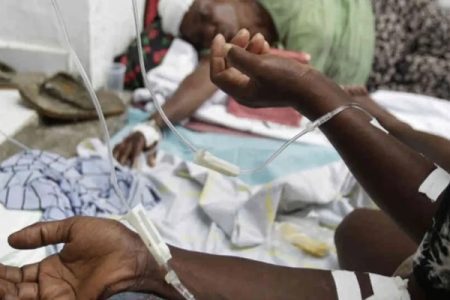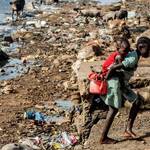A cholera outbreak in Ghana has claimed 27 lives and infected 252 people in the past two and a half months.
As of December 10, the outbreak has spread across 36 districts in the Greater Accra, Central, Western, and Eastern regions, with 3,292 suspected cases reported.
The Ghana Health Service (GHS) has recorded 190 cholera-related hospital admissions in the Western Region, while five patients are currently hospitalized in the Central Region.
According to Dr. Dennis Laryea, Head of Disease Surveillance at GHS, Greater Accra has recorded 70 confirmed cases, the Central Region 92, the Western Region 88, and the Eastern Region 25.
Delayed treatment contributing to fatalities
While most of the reported cases are not severe, fatalities have been linked to delays in seeking medical care.
“Deaths are occurring because most of the patients who had cholera tried to self-medicate. Some report to the hospital three days after the cholera infection,” Dr. Laryea explained.
Causes of the outbreak
The outbreak has been attributed to several factors, including a lack of clean water in affected districts, open defecation, and poor hand hygiene.
Dr. Laryea emphasized the importance of proper hygiene practices, urging the public to wash their hands with soap under running water or use hand sanitizers if clean water is unavailable.
Response measures in affected areas
Public health interventions, including surveillance and vaccination campaigns, are underway in the most affected areas, particularly in the Western Region.
The Ministry of Health has activated regional and district emergency committees, and rapid response teams have been deployed to contain the outbreak.
Cholera: A persistent public health threat
Cholera, caused by the bacterium Vibrio cholerae, remains a significant public health challenge, especially in areas with poor sanitation.
Symptoms include diarrhea, vomiting, dehydration, abdominal cramps, fever, and fatigue. Severe cases can lead to death within hours without prompt treatment.
Dr. Laryea highlighted that cholera had been largely under control in Ghana between 2017 and 2023, with only a few indigenous cases reported.
He credited handwashing practices adopted during the COVID-19 pandemic for the decline in infectious diseases during that period.
High-risk areas and prevention
Peri-urban slums and displacement camps are particularly vulnerable to cholera outbreaks due to inadequate access to clean water and sanitation.
Early detection and treatment are crucial to preventing severe complications and deaths.
Public advisory
The Ghana Health Service has issued a public advisory recommending the use of treated water, consumption of properly cooked food, avoidance of close contact with infected individuals, and adherence to strict hygiene practices.
It also stressed the importance of proper disposal of feces and seeking medical attention immediately for symptoms like severe diarrhea and vomiting.
With coordinated efforts and public vigilance, the government aims to curtail the outbreak and minimize further loss of life.
- Monday, May 12, 2025 Newspaper Headlines - 12 May 2025
- With honour culture, Mahama wouldn’t need appointee Code - 12 May 2025
- Dollar role under pressure from portfolio rebalancing - 11 May 2025

